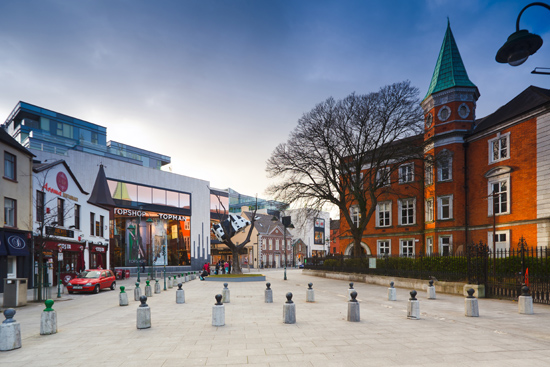Increased pedestrianisation and new cycling facilities proposed

18th May 2020
Further pedestrianisation of city centre streets, provision of additional cycling facilities, the creation of ‘cycle and walk’ facilities and ‘click and collect’ setdown areas and increased priority at pedestrian crossings are amongst a range of proposals being suggested to facilitate the next phase of the reopening of Cork City during COVID-19.
Phase one of the re-opening of Cork began today, Monday May 18. In tandem, the Marina was pedestrianised from last Friday until the end of August, pedestrianisation at Oliver Plunkett Street was reinstated and a deep clean of the city centre and Glanmire, Blarney, Douglas and Ballincollig is underway.
The following measures are proposed by Cork City Council for phase two - building on those underway as part of phase one. If agreed, these changes can be implemented in the short and medium term and aim to mirror the timing of the Government’s roadmap for lifting COVID-19 restrictions:
- Emmet Place, Father Matthew Street & Fitton Street East, Liberty Street & Cross Street, Castle Street and Daunt Square are being considered for pedestrianisation. Currently Harley Street is closed to facilitate snagging work remaining from the streetscape works undertaken last year. The possibility of expediting snagging works will be investigated to facilitate pedestrians only using the street again.
- Consideration is being given to creating a one- way pedestrian movement on Tobin Street, French Church Street and Carey’s Lane.
- The option of implementing and encouraging pedestrians to move on the right side of the following pedestrian bridges is being considered: Mary Elmes Bridge, Shandon Bridge, St Vincent’s Bridge, Trinity Bridge, Nano Nagle Bridge. There will be no impediment on pedestrian movement but like the London Underground, pedestrians will be encouraged to walk on the right.
- Individual requests to assign roadspace on streets and place structures on the street will be considered on receipt of the details.
- New bike stands are to be located at 43 new locations around the city to encourage people to consider cycling. These will be in key locations in the city centre, Blackpool, Douglas, Ballincollig, Tower, Glanmire and Blarney. Not all of these sites may be suitable, but the City Council will do its best to deliver bicycle facilities at as many locations as feasible.
- Key cycling routes into the city are being reviewed to identify any improvement measures to cycling infrastructure that could be implemented.
- Opportunities to convert sites to ‘Park & Walk’ facilities are being investigated. Any sites identified and deemed suitable, will have to be regularised and funded.
- Provision of set down or ‘click and collect’ areas to facilitate businesses are being considered on an area by area basis. Factors to be considered in the assessment include current availability of set down or parking spaces, availability of space to either provide new or reallocate existing parking to set down/click & collect, the demand for these type of spaces, other users’ needs including loading, disabled drivers etc.
- The timings at pedestrian crossings on the city centre island have been altered to give increased priority to pedestrian movements at these locations, thus reducing waiting times and limiting the potential for queues to form.
Cork City Council Assistant Chief Executive, Brian Geaney said: “Working with the Government’s reopening roadmap, the €3.5 billion Cork Metropolitan Area Transport Strategy (CMATS) and our own City Centre Movement Strategy (CCMS) as our overriding framework, we wanted to take a creative but evidence-based approach to reawakening and reimagining our city. First and foremost, we want residents, workers and visitors to the city to feel that they can safely practice social distancing in our city and that it is an attractive place to visit during these unusual times”.
“We started with the city centre but are looking out to the wider new city. Our approach protects health and wellbeing but all proposed interventions will need to be fully considered by all stakeholder interest groups in the city. In the medium term, we have a unique opportunity to rethink the future of the City in a way that boosts quality of life, sustainability and opportunity,” he said.
“While we are informed by other Irish and international cities, Cork is unique in the way that its homes, workplaces, retail and hospitality are configured and so we need a unique response. A street-by-street approach will be adopted in relation to particular on-street proposals. Cork City Council will seek unanimity of purpose as specific mobility measures are proposed for various streets,” he added.
Director of Strategic Economic Development, Fearghal Reidy said: “We have seen strong engagement around our recovery mobility plan. Our vision is creating a city of compact urban growth, a city that will be more resilient in the face of shocks like pandemics and extreme weather events. Therefore, it’s vital that we see people engage in the upcoming consultation around our new City Development Plan in the months ahead”.
